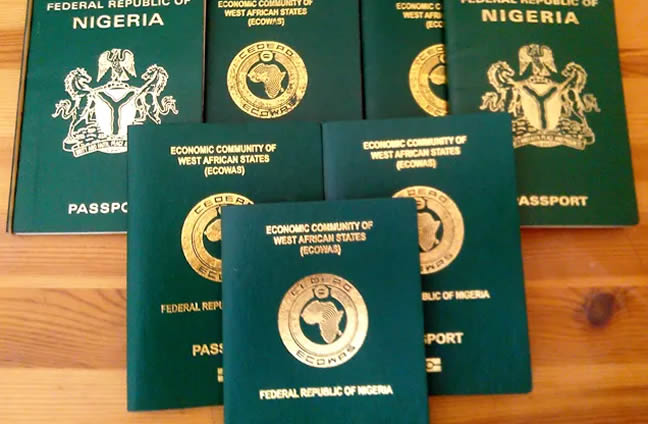The Nigerian passport fell by 32 places in a global passport ranking in the last 20 years, Sunday PUNCH reports.
This is according to the Henley Passport Index reports collated by our correspondent from 2006 to 2025.
The Henley Passport Index ranks passports according to the number of countries their holders can access visa-free or with a visa-on-arrival programme.
Although the Nigerian passport gained 11 more destinations, it fell from 62nd in 2006 to 94th in 2025.
While its ranking rose nine places—from 103rd in 2021 to 94th in 2025—the overall ranking showed a steady decline in strength amongst the 199 countries and 227 travel destinations studied.
The green passport now grants visa-free or visa-on-arrival access to 46 countries, up from the previous total of 35 in 2006, but Nigerians cannot access over 181 travel destinations without a visa, visa-on-arrival or e-visa arrangement.
As of January 2025, travellers with Nigerian passports could only traverse 25 countries visa-free.
However, this rises to at least 46 destinations when considering countries with visa-on-arrival or e-visa programmes for Nigerians.
Countries offering visa-free, visa-on-arrival and e-visa access to Nigerians in the 2025 report include Benin Republic, Burkina Faso, Cameroun, Cabo Verde, Chad, Comoros, Côte d’Ivoire, Djibouti, Ethiopia, The Gambia, Ghana, Guinea, Guinea-Bissau, Kenya, Lesotho, Liberia, Madagascar, Mali, Mauritania, Mauritius, Mozambique, Niger, Rwanda, São Tomé and Príncipe, Senegal, Seychelles, Sierra Leone, Somalia, Togo, Uganda, Zambia and Zimbabwe.
Others include Iran, Kyrgyzstan, Maldives, Timor-Leste, Antigua and Barbuda, Barbados, Dominica, Haiti, Saint Kitts and Nevis, Suriname, Fiji, Micronesia, Tuvalu and Vanuatu.
According to the Henley Passport Index, based on data from the International Air Transport Association, a fall or improvement in ranking results from a country’s efforts to strengthen its diplomatic relations with other nations, modernise its visa processes and improve security measures at its borders.
However, recent findings by The PUNCH revealed that despite the Federal Government’s multi-billion-naira border surveillance systems launched in 2019, illegal migrants, some of whom have been identified as bandits, terrorists and kidnappers, continued to cross into Nigeria from the Republics of Benin, Chad, Niger, Mali and Cameroon.
Checks by our correspondents from residents of border communities in the Baruten Local Government Area of Kwara State revealed that illegal immigrants still crossed the border into the country daily.
Other reports from Maigatari, a border community in Jigawa State, also revealed that the system was ineffective.
Experts reasoned that the strength of the green document only reflects the internal challenges bedevilling Nigeria.
In an interview with our correspondent, Research Director, Center for China Studies, Abuja, Charles Onunaiju, argued that the measly visa-free access Nigerians enjoy globally reflects the country’s internal challenges.
“We have a challenge. Since Nigeria is becoming inhospitable, especially for young people with no opportunities, there is desperation to go abroad.
“Almost all embassies now enforce regulations on Nigerians they don’t impose on other nationals. That is very clear. People feel that almost every Nigerian wants to leave here. That’s partly true because the nation has mishandled the potential in it. Our leaders have not harnessed the vast human resources available to us.
“If we want to earn respect from outside, we must begin from home. If we want the world to take us seriously, we must get your acts together,” Onunaiju said.
However, ex-officials of Nigeria’s passport issuing agency, the Nigeria Immigration Service, argued otherwise. He said visa-free mobility primarily reflects bilateral agreements between countries and within regional blocs.
One official who spoke under anonymity said, “Henley’s ranking is based on passport admissibility. And that is largely a function of mutual understanding and reciprocity among countries, which does not necessarily reflect the true strength of a passport. A good example is the European Union and the ECOWAS.
“While we appreciate their work, the NIS is more concerned with deepening its passport technology to meet the standards of the ICAO. The goal is to ensure that our passport complies with ICAO guidelines.”
Another ex-official noted that Nigeria has been a Public Key Directory of the ICAO since April 2009 and is respected globally.
The Public Key Directory is a central repository for exchanging the information required to authenticate electronic Machine-Readable Travel Documents such as e-passports, electronic ID cards and Visible Digital Seals.
The ex-official stated, “What we emphasise here is our standing in the ICAO. When ICAO alerts us of any lapses with our passports, we get to work. Nigeria has been part of the Public Key Directory since 2009 and it took us complying with several passport security specifications to be reflected on that directory.”
